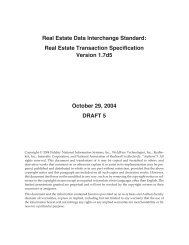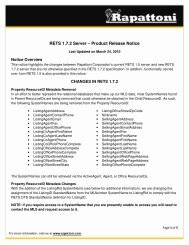Specification - RETS
Specification - RETS
Specification - RETS
Create successful ePaper yourself
Turn your PDF publications into a flip-book with our unique Google optimized e-Paper software.
S ECTION<br />
0MESSAGE FORMAT<br />
CHAPTER<br />
<strong>RETS</strong> uses HTTP version 1.1 [2] for sending messages between clients and servers. It<br />
defines three additional HTTP headers, and some <strong>RETS</strong> transactions constrain the values<br />
of certain headers defined by HTTP 1.1 and/or make certain headers designated as<br />
optional in HTTP 1.1 mandatory when used for <strong>RETS</strong>. In addition, <strong>RETS</strong> requests use<br />
HTML 4.01 [16] form encoding to encapsulate request parameters. In addition, a<br />
compliant <strong>RETS</strong> client MUST implement cookie handling as specified in RFC 2109 [15].<br />
The information below summarizes some of the requirements of HTTP 1.1 and<br />
HTML 4.01 for ease of reference. However, in all cases, the underlying standards are the<br />
normative references for message formats.<br />
3.1 General Message Format<br />
3.1.1 <strong>RETS</strong> HTTP/1.1 Encapsulation<br />
3.1.2 Request Arguments<br />
<strong>RETS</strong> messages are encapsulated as the bodies of HTTP/1.1 requests and responses. The<br />
request body may be null, depending on the request. The response body is never null<br />
Note that, per RFC 2822, keywords in header key-value pairs are not case-sensitive. The<br />
values, however, may be case-sensitive depending on context.<br />
<strong>RETS</strong> requests are HTML 4.01-compliant form submissions, following all of the<br />
specifications in the HTML 4.01 recommendation. Note that the HTML 4.01 specification<br />
provides that:<br />
• Key names in key/value pairs are not case-sensitive.<br />
• Both key names and key values MUST be encoded as specified in HTML 4.01 section<br />
17.13.4, with + characters replacing spaces, and then reserved characters being<br />
escaped per RFC 2396 [13], unless the client uses a content-type of multipart/formdata.<br />
Version 1.7.2 3-1




